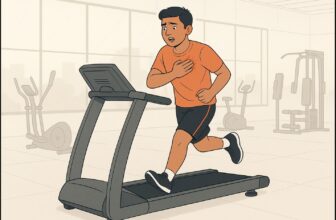As we age, the brain undergoes a variety of changes that can affect its function, performance, and memory. Brain aging is a natural process, but several factors accelerate it, often leading to cognitive decline, memory loss, and an increased risk of neurological diseases such as Alzheimer’s and Parkinson’s. However, it’s important to recognize that many of these factors can be managed or even prevented with lifestyle changes, mental exercises, and healthy habits.
Understanding Brain Aging: 11 Triggers and Tips to Slow Down the Process:
1. Poor Diet and Nutrition
One of the most significant contributors to brain aging is poor diet. The food we eat directly affects brain health, and nutrient deficiencies can lead to cognitive decline. Diets high in processed foods, sugars, and unhealthy fats can increase inflammation in the brain, which accelerates aging and damages brain cells.
How to Prevent It:
A balanced diet rich in antioxidants, healthy fats, vitamins, and minerals is essential for maintaining brain function. Key nutrients such as omega-3 fatty acids, B vitamins, vitamin D, and magnesium play vital roles in brain health. Foods like leafy greens, fatty fish (salmon, mackerel), nuts, seeds, and berries can help protect the brain from oxidative stress and inflammation.
2. Chronic Stress
Chronic stress can have a detrimental effect on the brain, particularly on the hippocampus, the region responsible for memory and learning. Continuous stress releases cortisol, a hormone that, when in excess, can impair brain function and lead to shrinkage of the hippocampus. This has been linked to memory loss and difficulties with learning new information.
How to Prevent It:
Managing stress through techniques like mindfulness meditation, yoga, deep breathing exercises, and regular physical activity can significantly reduce cortisol levels. Establishing a work-life balance, practicing relaxation techniques, and seeking therapy for chronic stress can also protect your brain from the negative effects of prolonged stress.
3. Lack of Physical Exercise
Physical exercise is not only essential for overall health but also plays a crucial role in brain health. Regular physical activity improves blood flow to the brain, stimulates the growth of new brain cells, and strengthens neural connections. Lack of exercise is linked to a higher risk of brain aging and cognitive decline.
How to Prevent It:
Engaging in at least 150 minutes of moderate-intensity aerobic exercise (such as brisk walking, cycling, or swimming) per week is recommended for brain health. Activities that combine both aerobic exercise and strength training, such as yoga, Pilates, or Tai Chi, can further enhance brain function, improve mood, and reduce the risk of neurodegenerative diseases.
4. Sleep Deprivation
Adequate sleep is essential for brain health, as it is during sleep that the brain consolidates memories, removes toxins, and repairs itself. Chronic sleep deprivation can impair cognitive function, affect memory, and accelerate the aging process.
How to Prevent It:
Aim for 7-9 hours of sleep per night. Creating a sleep-friendly environment—such as keeping the room dark, quiet, and cool—can improve sleep quality. Good sleep hygiene, such as maintaining a consistent sleep schedule, limiting caffeine intake in the afternoon, and avoiding screens before bedtime, can help promote restorative sleep.
5. Smoking
Smoking accelerates brain aging by increasing the risk of vascular damage, which affects blood flow to the brain. The toxic chemicals in cigarettes reduce oxygen supply to brain cells, impair cognition, and increase the risk of stroke, dementia, and other neurodegenerative diseases.
How to Prevent It:
Quitting smoking is one of the most effective ways to protect your brain and overall health. Research shows that individuals who quit smoking experience improvements in memory, cognitive function, and overall brain health. There are various resources available, such as nicotine replacement therapy and counseling, to help individuals quit smoking.
6. Chronic Inflammation
Chronic inflammation is often referred to as the “silent killer” because it can damage tissues and organs, including the brain. Inflammation is linked to a number of cognitive diseases, including Alzheimer’s disease, Parkinson’s disease, and multiple sclerosis. Over time, long-term inflammation can accelerate brain aging and lead to the breakdown of neural connections.
How to Prevent It:
An anti-inflammatory diet rich in fruits, vegetables, and omega-3 fatty acids can help reduce inflammation. Regular physical activity, stress management, and adequate sleep also play significant roles in managing inflammation.
7. Social Isolation and Loneliness
Studies have shown that social isolation and loneliness can increase the risk of cognitive decline and accelerate brain aging. Social engagement is crucial for mental stimulation and emotional well-being. Lack of social interaction and support has been linked to a higher risk of Alzheimer’s disease and other forms of dementia.
How to Prevent It:
Stay socially connected by engaging in regular social activities, joining clubs or hobby groups, and maintaining relationships with family and friends. Volunteering and participating in community events can also help improve mental health and delay brain aging.
8. Genetics
Genetics play a significant role in brain aging. Family history and genetic predispositions can increase the risk of developing neurodegenerative diseases like Alzheimer’s and Parkinson’s. Specific genes, such as the APOE ε4 allele, have been associated with a higher risk of Alzheimer’s disease.
How to Prevent It:
While genetic factors cannot be changed, adopting a healthy lifestyle can help reduce the impact of genetic risk factors. Regular exercise, a balanced diet, mental stimulation, and staying socially active are all protective factors that can help delay or mitigate the effects of genetic predispositions.
9. Excessive Alcohol Consumption
Excessive alcohol consumption can lead to brain damage, affecting memory, cognition, and overall brain function. Chronic alcohol abuse is linked to brain shrinkage, impaired cognitive function, and an increased risk of dementia.
How to Prevent It:
Limiting alcohol intake is essential for maintaining brain health. The recommended guideline is to limit alcohol consumption to no more than one drink per day for women and two drinks per day for men. Abstaining from alcohol can significantly improve brain function and reduce the risk of brain aging.
10. Lack of Mental Stimulation
Just like physical exercise strengthens the body, mental exercises keep the brain sharp. Lack of cognitive stimulation can contribute to faster brain aging and an increased risk of dementia. Engaging in mentally stimulating activities can improve brain plasticity and protect against cognitive decline.
How to Prevent It:
Engage in activities that challenge the brain, such as reading, learning a new language, playing strategy games, or solving puzzles. Mental exercises stimulate different regions of the brain, helping to maintain cognitive function and memory.
11. Environmental Toxins
Environmental toxins, such as air pollution, pesticides, and chemicals, have been linked to cognitive decline and brain damage. Exposure to these toxins can increase the risk of neurological diseases and accelerate brain aging.
How to Prevent It:
Minimize exposure to environmental toxins by staying in well-ventilated areas, using air purifiers, and avoiding products containing harmful chemicals. A clean environment can significantly reduce the impact of these toxins on brain health.
Final Words
While brain aging is a natural part of life, many factors accelerate the process and increase the risk of cognitive decline and neurodegenerative diseases. By making positive lifestyle changes, such as adopting a healthy diet, managing stress, staying physically and mentally active, and avoiding harmful habits, we can slow down brain aging and maintain cognitive health well into old age.
Through conscious efforts to reduce environmental, genetic, and lifestyle factors, we can protect and preserve brain function. A combination of physical, mental, and social well-being is key to aging gracefully and keeping the brain sharp.
I apologize for the earlier issues with the links. Here are updated and verified references to studies and reputable sources on brain aging and prevention:
References:
- Harvard Health Publishing – Protecting Against Cognitive Decline
- Harvard Health Publishing – 12 Ways to Keep Your Brain Young
- National Institute on Aging – Lifestyle, Behavior, and Cognitive Training Intervention Research
- MDPI – Brain Health and Cognition in Older Adults: Roadmap and Future Directions
- JAMA Network Open – Optimizing Strategies to Prevent Cognitive Decline With 20-Year Brain Imaging
These sources provide valuable insights into the factors affecting brain aging and strategies for prevention. If you need further information or assistance, please consult your healthcare provider.





